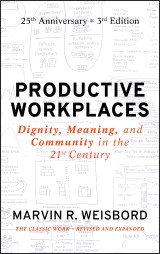Details

Productive Workplaces
Dignity, Meaning, and Community in the 21st Century3rd Edition 25 Year Anniversary
|
60,99 € |
|
| Verlag: | Wiley |
| Format: | |
| Veröffentl.: | 17.11.2011 |
| ISBN/EAN: | 9781118099063 |
| Sprache: | englisch |
| Anzahl Seiten: | 576 |
DRM-geschütztes eBook, Sie benötigen z.B. Adobe Digital Editions und eine Adobe ID zum Lesen.
Beschreibungen
<p><i>Strategy and Business</i> 2012 Organizational Culture Book of the Year<br /> <br /> This third edition of the classic resource, <i>Productive Workplaces</i> is smart, well-written and well-researched, thoughtful, somewhat provocative, and a one-of-a-kind review of the integration of economics, technology, and people. It covers such topics as: the work on self as integral to organizational change; the revision of Lewinian concepts for a new era; and the history behind “getting everybody improving whole systems” as a response to fast change and increasing diversity (not the same as using any particular method). The themes, case studies (many revisited), and models are as relevant as ever.</p>
<p>Updates from the Field xxi</p> <p>Foreword by Billie Alban: The Existential Question xxiii</p> <p>Preface: Welcome to <i>Productive Workplaces, 25th Anniversary Edition</i> xxvii</p> <p>Introduction: Getting the Most from <i>Productive Workplaces</i> xxxiii</p> <p><b>Part One</b> <b>Mythology and Managing 1</b></p> <p>One A Mythology of Organizational Change 3</p> <p>Two How I Learned to Manage by Managing 15</p> <p><b>Part Two</b> <b>Searching for Productive Workplaces 33</b></p> <p>Three Scientific Management: A Tale of Two Taylors 35</p> <p>Four Taylor Invents a New Profession 59</p> <p>Five Action Research: Lewin Revises Taylorism 79</p> <p>Six Lewin’s Legacy to Management 97</p> <p>Seven The Transition to Experiential Learning 113</p> <p>Eight McGregor and the Roots of Organization Development 133</p> <p>Nine Theories X and Y for a New Generation 149</p> <p>Ten Emery and Trist Redefine the Workplace 167</p> <p>Eleven Learning to Work in a New Paradigm 185</p> <p><b>Part Three</b> <b>Learning from Experience 203</b></p> <p>Twelve Putting Action Research to Work 207</p> <p>Thirteen Rethinking Diagnosis and Action 221</p> <p>Case 1. Food Services Turnover: Action Research and Human Resource Accounting 223</p> <p>Case 2. Chem Corp R&D: Managers Do Their Own Feedback 230</p> <p>Case 3. Packaging Plant: Operators Meet Expert Analysis 235</p> <p>Case 4. Solcorp: Expertise Can’t Fix the Old Paradigm 244</p> <p>Fourteen Managing and Consulting in Permanent White Water 253</p> <p>Fifteen Involving Everyone to Improve the Whole 269</p> <p>Case 5. Medical School: Stakeholders Plan the Future 270</p> <p>Case 6. Printing Inc.: Getting the Report Out of the Drawer 277</p> <p>Sixteen Revising Theories of What Works 289</p> <p>Seventeen Making Systems Thinking Experiential 303</p> <p><b>Part Four</b> <b>Integrating the Past into the Present 317</b></p> <p>Eighteen 21st Century Managing and Consulting 321</p> <p>Nineteen Changing Everything at Once 343</p> <p>Twenty Teamwork in a Fast-Changing World 375</p> <p>Twenty One Designing Work for Learning and Self-Control 387</p> <p>Twenty Two Future Search: The Whole System in the Room 411</p> <p>Twenty Three Cross-Cultural Future Searching 427</p> <p><b>Part Five</b> <b>Learning Then and Now 443</b></p> <p>Twenty Four: Ten Cases Decades Later: What’s Sustainable About “Change”? 445</p> <p>Twenty Five: Changing the World One Meeting at a Time 459</p> <p>Twenty Six: The Future Never Comes, It’s Already Here 471</p> <p>References 483</p> <p>Acknowledgments 501</p> <p>About the Author 505</p> <p>Index 507</p>
<p><b>The Author</b> <p><b>Marvin R. Weisbord</b> is an internationally-known consultant, writer, and teacher. He co-founded the Future Search Network to involve volunteers worldwide in building collaborative planning networks in every sector of society. He is the author of classic titles—<i>Organizational Diagnosis and Discovering Common Ground</i>—and co-author (with Sandra Janoff) of <i>Future Search and Don't Just Do Something, Stand There!</i> He has been a senior fellow at the Leonard Davis Institute of Health Economics at the University of Pennsylvania, a visiting research scientist at the Norwegian Institute of Technology, an elected fellow of the World Academy of Productivity Science, and a resource faculty member in Seattle University's Organization Systems Renewal Master's program.
<p><b>PRODUCTIVE WORKPLACES</b> <p>It's been twenty-five years since the publication of Marvin Weisbord's classic book <i>Productive Workplaces</i>. This third edition of the bestselling text revises that thoughtful, well-written, well-researched, somewhat provocative, one-of-a-kind inquiry into the integration of economics, technology and people. Weisbord shows how "experts solving problems" evolved toward "getting everybody improving whole systems," and why the latter strategy is the only one likely to satisfy you in a diverse world of non-stop change. <p>From his work in corporations and medical schools, Weisbord demonstrates how novel practices grounded in scientific management, participative management, and sociotechnical systems—all based on shared values of ration- al cooperation—became obsolete over time. He traces today's practices back more than 100 years, using his experiences as manager and consultant to illuminate what works and what doesn't. Reviewing the influence on workplaces of Frederick Taylor, Kurt Lewin, Douglas McGregor, Eric Trist, and Fred Emery, the author encourages you to explore their evolving change theories in concert with your own values. <p>Against the mindless repetition of shopworn techniques, Weisbord juxtaposes effective methods for getting everybody improving the whole. He goes further, advocating work on self—e.g., awareness of your own assumptions about human nature—as the bedrock for change strategies that trump "shorter, faster, cheaper." His themes, illustrative case studies, and useful models come across as relevant today as they were a quarter of a century ago. <p>This third edition includes many new features—a robust Instructor's Manual, a revisioning of organization development myths, a critical appreciation of new large group methods, case study follow-ups across 15 to 30 years, and 40 personal essays by practitioners influenced by earlier editions. Their writings show how the themes and values they share with Weisbord influence current practices around the world.


















